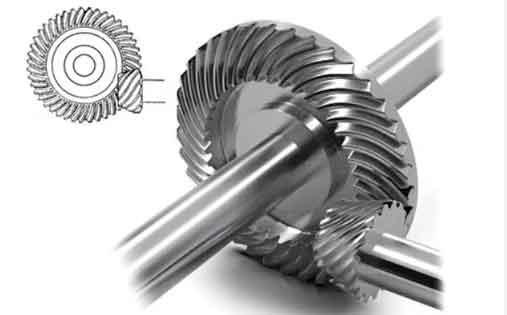Eco-friendly manufacturing processes for spiral bevel gear is increasingly important in the context of global efforts to reduce environmental impact, improve sustainability, and adhere to stricter regulations on emissions and waste management. These processes are designed to minimize the ecological footprint of spiral bevel gear production while maintaining or enhancing the quality and performance of spiral bevel gear. Here are some key aspects and methods involved in eco-friendly manufacturing processes for spiral bevel gear:

1. Material Efficiency and Recycling
- Use of Recycled Materials: Incorporating recycled or reclaimed materials in the manufacturing process reduces the need for virgin materials, thereby conserving resources and reducing the environmental impact associated with material extraction and processing.
- Material Optimization: Advanced design and simulation tools can optimize material usage, ensuring that only the necessary amount of material is used to achieve the desired strength and durability, thus minimizing waste.
2. Energy-Efficient Manufacturing
- Adoption of Energy-Efficient Machinery: Utilizing modern, energy-efficient machines for cutting, shaping, and finishing spiral bevel gear can significantly reduce the energy consumption of the manufacturing process.
- Process Optimization: Implementing lean manufacturing techniques and continuous process improvement methodologies can help in identifying and eliminating energy wastage, further reducing the carbon footprint of production.
3. Advanced Manufacturing Technologies
- Additive Manufacturing (3D Printing): This allows for more precise material deposition with minimal waste, producing spiral bevel gear with complex geometries that would be more difficult and less efficient with traditional subtractive methods.
- Near-Net-Shape Manufacturing: Techniques that produce components close to their final shape can drastically reduce material waste and the need for further machining.
4. Use of Sustainable Lubricants and Coolants
- Biodegradable Lubricants: Switching to lubricants and coolants made from renewable resources not only reduces the environmental harm in case of disposal or leakage but also often comes with improved lubrication properties, reducing energy consumption during machining.
- Recycling and Filtration Systems: Implementing systems for recycling and filtering used lubricants and coolants can significantly reduce the need for disposing of these materials, decreasing environmental pollution and the demand for fresh resources.
5. Waste Management and Minimization
- Recycling Chips and Scraps: Metal chips and scraps generated during spiral bevel gear manufacturing can be collected and recycled, reducing waste and providing a source of material for other products.
- Digital and Lean Manufacturing: Digital tools and lean manufacturing strategies can streamline production processes, reduce errors and rework, and minimize the generation of waste.
6. Renewable Energy Sources
- Powering Production with Renewable Energy: Shifting to renewable energy sources such as solar, wind, or hydroelectric power for manufacturing facilities can significantly reduce greenhouse gas emissions associated with spiral bevel gear production.
7. Eco-friendly Packaging and Transportation
- Sustainable Packaging: Using recyclable or biodegradable packaging materials reduces the environmental impact associated with spiral bevel gear distribution.
- Optimized Logistics: Planning for more efficient transportation routes and methods can lower the carbon footprint associated with distributing the finished spiral bevel gear.
Adopting these eco-friendly manufacturing processes not only helps in reducing the environmental impact of spiral bevel gear production but can also lead to cost savings, improved product quality, and enhanced brand reputation among environmentally conscious consumers and businesses. As global environmental standards continue to tighten, integrating these practices becomes increasingly critical for the sustainability of manufacturing operations and the planet.
